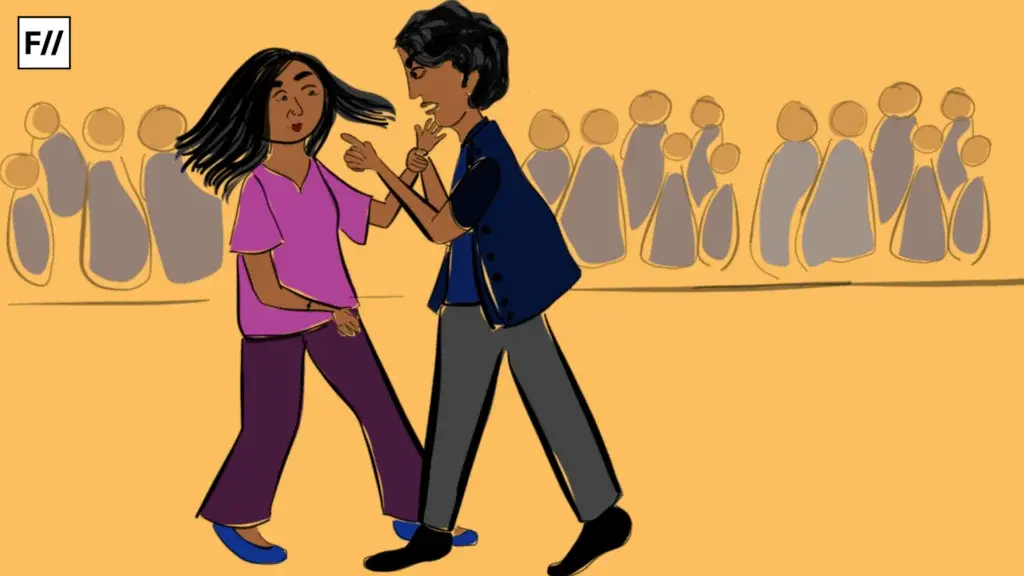In a society where women are shamed for seeking justice in cases of domestic violence and called out for alleged ‘false complaints’, Gyanwati’s resilience is encouraging.
News about domestic violence makes it to our newspapers and websites every day, often sensationalised in a small column or a section dedicated to “women’s issues”. It almost feels like an obligatory service that news needs to be a part of as opposed to a sensitive and sustained coverage. Often, such coverage only leads to a sense of fatigue; yet another story of domestic violence, yet another rape, yet another statistic.
Gyanwati could be just another face in the sea of stories that make up these statistics. But her story is just as important as anyone else’s and, in fact, illustrates all that is wrong with institutions that act as the pillars of our society, especially the family, the law and the state.
Gyanwati was subjected to physical violence and verbal abuse for being dark-skinned and eating “too much”. Her husband’s family even threatened to kill both her and her children. Young girls across the country are often told that no one will marry them if they are dark-skinned or that eating a lot is unbecoming for a woman.
such coverage only leads to a sense of fatigue; yet another story of domestic violence, yet another statistic.
“My father-in-law taunts my husband that he can’t even leave one wife when he (father-in-law) left four women”, says Gyanwati, who is currently living in her natal home with her parents and her children.
When she first went to the local police station to file a complaint against the violence, the police refused to register her complaint. She went again, twice, to follow-up but no action was taken even then. On the contrary, she was made to stay at the police station all day while her husband was asked to leave in the afternoon and this made her more suspicious of seeking help from the police.
Also Read: Attacked And Disfigured By Husband: A Survivor Of Horrific Physical Violence Speaks Up
The police have been known to be unhelpful in such situations, even dismissive and insensitive. When our Community Correspondents were monitoring the efficiency of the 181 Women’s Helpline, they also spoke to some police personnel about it.
A policeman stationed in Gwalior said that if women come to the police station to complain about their families, it will only make matters worse for them. He was of the opinion that women should refrain from making formal complaints. In another case in Bihar, when a man went to complain about his sister having been trafficked, his request was dismissed because “things like this happen every day”.
Gyanwati also approached the Family Counseling Centre in her district. These centres were set up under a government scheme in 1983 to support survivors of domestic violence, they are overseen by the Ministry of Women and Child Development. However, women don’t always get the right kind of support in these centres.
Like family, counsellors too may ask women to ‘compromise’ to make a marriage work. Even the Minister for Women and Child Development, Maneka Gandhi, has gone on record to say that something like marital rape cannot be applied to the Indian context because of literacy levels, society’s treatment of marriage as a sacrament and so on. A marriage must work, and when it doesn’t, the woman must make it work or settle for what she has.
Like family, counsellors too may ask women to ‘compromise’ to make a marriage work.
Gyanwati, however, is not willing to settle for the current situation. She wants to live in her marital home and wants her children to grow up and go to school in a safe environment. She now wants a written guarantee from her husband and in-laws.
Her fierceness to see herself out of this situation is an aberration to the rule because few women go as far with a domestic problem, owing to the way society treats them for doing so. This is one of the major reasons behind why violence against women is one of the most underreported crimes in the country.
Lakhuprasad Prajapati, the Community Correspondent who documented her story is now trying to take it up with the Women’s Commission at the district level. To help him and women like Gyanwati make the grievance-redressal system more survivor-centred, call Lata Wankhede from the Women’s Commission in Panna, at 7552661802 and tell her to ensure that Gyanwati is given the support that she needs.
Also Read: When The Personal Is Political: Inequality Within Marriage
Video by Community Correspondent Lakhuprasad Prajapati.
Article by Alankrita Anand, a member of the VV editorial team.
Featured Image Credit: Video Volunteers YouTube
About the author(s)
Video Volunteers works to centre the lived experience of marginalised communities in public discourse and decision-making. Over the past 20 years, we’ve supported community-led reporting models in India and globally, enabling people to document issues affecting their lives and push for accountability. In India, our network of Community Content Creators has produced over 18,000 videos on local governance and social justice issues, contributing to more than 3,200 documented resolutions and impacting over 42 million people. Our work focuses on strengthening accountability, amplifying citizen voice, and using accessible technology to make institutions more responsive.





Wow! Brave women.
She will be inspiration to every Indian women.
Thanks for this great article.